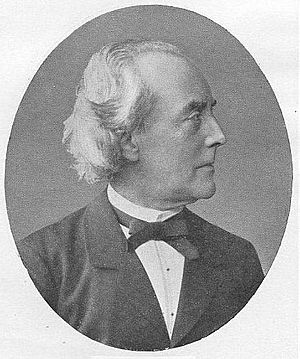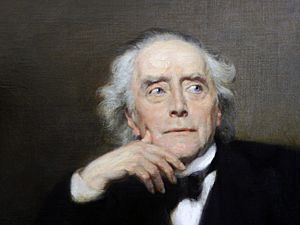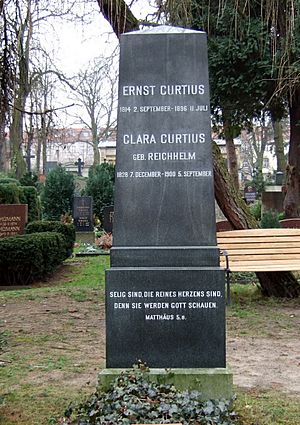Ernst Curtius facts for kids
Quick facts for kids
Ernst Curtius
|
|
|---|---|

Photograph from Imagines Philologorum
by Alfred Gudeman |
|
| Born | 2 September 1814 |
| Died | 11 July 1896 (aged 81) Berlin
|
| Nationality | German |
| Known for | Olympia |
| Scientific career | |
| Fields | archaeology |
Ernst Curtius (born September 2, 1814, died July 11, 1896) was an important German archaeologist, historian, and museum director. He is famous for leading the major excavations at Olympia in Greece. This is the ancient site where the original Olympic Games were held. His work helped people understand the history of the Olympic Games and ancient Greece.
Contents
Ernst Curtius's Early Life and Career
Ernst Curtius was born in Lübeck, Germany. After finishing his university studies, he traveled to Greece with a scholar named C. A. Brandis. They worked together on archaeological research, studying ancient ruins and artifacts.
Later, Curtius joined Karl Otfried Müller to explore the Peloponnese region of Greece. When Müller passed away in 1840, Curtius returned to Germany. In 1844, he became a professor at the University of Berlin. He also taught Prince Frederick William, who later became Emperor Frederick III. Curtius held this teaching position until 1850.
After teaching at the University of Göttingen, Curtius went back to Greece in 1862. In 1863, he became a full professor in Berlin.
Discovering Ancient Olympia
In 1874, the German government sent Curtius to Athens, Greece. There, he made an important agreement. This agreement gave Germany the special right to dig at Olympia. This was a huge step for archaeology.
On June 10, 1852, Ernst Curtius gave a famous speech about Olympia in Berlin. This speech helped start the idea of digging up the ancient site. It also encouraged more historical archaeology work in Greece.
After another professor, Eduard Gerhard, died in 1867, Curtius took over his role. He became the professor of classical archaeology in Berlin. At the same time, Curtius also directed the Altes Museum and Antiquarium. These are museums that display ancient artifacts.
A war between Turkey and Russia (1877-1878) caused some delays. But eventually, an agreement was reached between the Greek and German governments. This allowed the excavations at Olympia to begin.
Curtius had good connections with the royal family. This helped him convince the government to support the German Archaeological Institute. In 1874, the Greek government gave this institute the only right to dig at Olympia.
On April 25, 1874, Curtius signed a very important agreement in Athens. This agreement said that all the ancient items found by the Germans must stay in Greece. A special museum was even built right at the site to keep these finds.
The Olympia Excavations
In 1875, Curtius led large teams of archaeologists to Olympia. They worked to carefully uncover the ancient city. The first excavation started at Olympia in Elis, which was the original site of the Olympic Games. For a thousand years, these games were held there.
Within six years, the teams cleared the Olympic stadium. They found the starting blocks for runners and the judges' seats. The archaeologists also uncovered the temples of Zeus and Hera. These were important gods in ancient Greek religion.
The discoveries from Olympia were shared in scientific journals across Europe. This happened between 1890 and 1897. German archaeologists also created paintings of the Olympic site. They showed how the Olympic Games were held. These efforts helped the Western world understand how important it was to bring back the Olympic Games.
Ernst Curtius's Writings
Ernst Curtius wrote many books and articles. His most famous work is History of Greece (1857–1867). This book shared the newest research about ancient Greece in an interesting way.
He also wrote many books about archaeology. Some of his important works include:
- Die Akropolis von Athen (1844)
- Naxos (1846)
- Peloponnesos, eine historisch-geographische Beschreibung der Halbinsel (1851)
- Olympia (1852)
- Die Ausgrabungen zu Olympia (1877, etc.)
- Die Stadtgeschichte von Athen (1891)
His collected speeches and lectures were published in books like Altertum und Gegenwart.
Family Life
Ernst Curtius had a brother named Georg Curtius. Georg was also a well-known scholar who studied languages.
See also
 In Spanish: Ernst Curtius para niños
In Spanish: Ernst Curtius para niños



